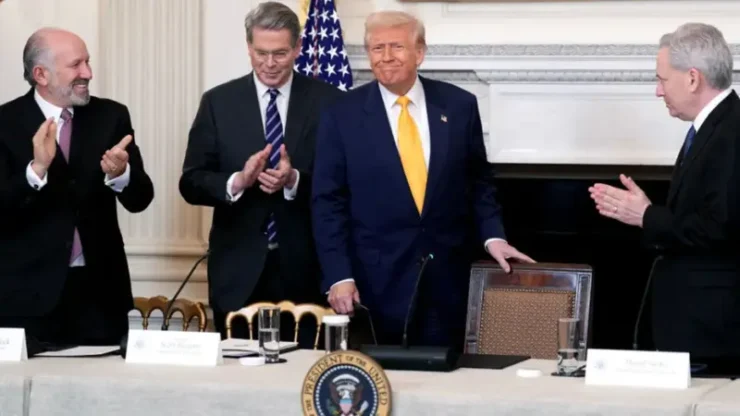President Donald Trump’s decision to establish a government cryptocurrency reserve has ignited debate over its transparency and economic impact. The move, formalized through an executive order, creates a Strategic Bitcoin Reserve and a Digital Asset Stockpile. The government will fund these reserves with cryptocurrency seized in criminal and civil forfeitures, a strategy officials claim will not impose costs on taxpayers.
White House AI and crypto advisor David Sacks described the initiative as a “digital Fort Knox for cryptocurrency.” However, the administration’s decision not to actively purchase Bitcoin has drawn skepticism from industry leaders. Some view the plan as a missed opportunity, while others warn that the inclusion of multiple cryptocurrencies could create market distortions.
Bitcoin Holdings and Government Strategy
Sacks estimated the federal government currently holds around 200,000 Bitcoin, valued at approximately $17.5 billion. The administration’s executive order mandates a full audit of federal cryptocurrency reserves. However, it restricts future Bitcoin acquisitions to those that do not increase the national deficit or debt.
“We are only allowed to buy more if it doesn’t add to the deficit or the debt,”
Sacks told reporters ahead of a scheduled White House crypto summit. The decision has been met with criticism from industry players who argue that failing to actively purchase Bitcoin could weaken the U.S. position in global digital asset markets.
Charles Edwards, founder of Capriole Fund, dismissed the announcement as “a pig in lipstick,” calling it a mere rebranding of existing holdings. Jason Yanowitz, co-founder of crypto firm Blockworks, supported the idea of a Bitcoin reserve but cautioned against the inclusion of additional digital assets, warning it could “distort the markets and drive a loss of public trust.”
Market Reactions and Investor Concerns
Following Trump’s announcement, Bitcoin’s price fell sharply, dropping as much as 6% before stabilizing. Investors had anticipated a more aggressive government purchasing strategy, and the lack of such measures triggered a market sell-off. Stefan von Haenisch, director of over-the-counter trading at Bitgo Inc., said expectations of government buying had driven recent Bitcoin gains, and those positions were now being reversed.
Other cryptocurrencies named by Trump, including Ethereum, XRP, Solana, and Cardano, initially saw price increases but later experienced declines. Analysts noted that government involvement in digital assets could introduce new risks, including potential legal challenges and market favoritism. Yanowitz emphasized the need for independent audits and public reporting to prevent government intervention from becoming an instrument of influence over private markets.
Legal and Economic Uncertainty
The executive order directs federal agencies, including intelligence services, to audit and self-report their cryptocurrency holdings. Treasury officials will then set up separate accounts for Bitcoin and other digital assets. However, it remains unclear whether the administration has the legal authority to manage a crypto reserve without congressional approval.
Sacks maintained that the plan “will not cost taxpayers a dime,” but critics argue that the government’s handling of digital assets could set precedents for regulatory overreach. Some industry figures worry that the administration’s approach may be inconsistent, given Trump’s past pledges to make the U.S. the “crypto capital of the planet.”
Russ Mould, investment director at AJ Bell, viewed the initiative more favorably, stating that leveraging seized assets is preferable to government purchases.
“It would surely be bizarre for the U.S. to sell dollars to buy crypto, when the dollar is the globe’s reserve currency and therefore a source of enormous influence,” Mould said.
Political and Market Fallout
The announcement coincides with a meeting between Trump, Sacks, and executives from major crypto firms, including Coinbase and Robinhood. While some industry leaders expressed optimism about government involvement in digital assets, others remained cautious, noting that the lack of a clear framework could discourage institutional investment.
Andrew O’Neill, managing director of digital assets at S&P Global Ratings, called the executive order “mainly symbolic,” adding that it marks “the first time Bitcoin is formally recognized as a reserve asset of the United States government.”
Despite Trump’s assurances, investors remain wary of future government actions. Bloomberg reported that regulatory concerns and market volatility have dampened enthusiasm for the administration’s crypto strategy. Meanwhile, Bitcoin’s price remains well below its January peak of $109,071, reflecting ongoing uncertainty over the federal government’s role in the digital asset space.





